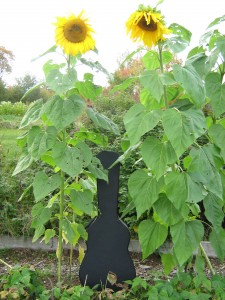A while back I was talking to an editor about A Life’s Work. As we delved into the specifics, I told him about various ideas I had for the film. At one point he said, “These are good ideas, but I’ve found that most times only about 5% of those ideas actually work. But it’s still good to have a lot them. You want more ideas than fewer ideas.”
 One of my ideas was to record the score outside, in the country, in the desert, in the streets, on a campus. Something like field recording. When I told other filmmaker friends about this, they thought I was insane. “If you want crickets in the background,” they said, “go record crickets in the field and the music in the studio and add the cricket track in post!”
One of my ideas was to record the score outside, in the country, in the desert, in the streets, on a campus. Something like field recording. When I told other filmmaker friends about this, they thought I was insane. “If you want crickets in the background,” they said, “go record crickets in the field and the music in the studio and add the cricket track in post!”
Recording outside presents many difficulties. There is a lack of control–birds chirp loudly, wind gusts, car horns blow. Listen to Black Country Woman by Led Zepplin and you can hear an airplane overhead. There is also the possibility of being attacked by wildlife — as Robert Plant discovered. There is a story that when Plant tried to lay down a vocal track at Headley Grange, he was attacked by a gaggle of geese!
And yet…
I think there is something special about recording live music in nature. But what? Yes, there is a different ambiance (in the sonic sense); every room has a different tone, every outdoor setting different sounds. But it’s more than that. Maybe music recorded in nature has an element of chance that’s palpable? And does it matter if that palpability is sensed only by some insiders who know it was recorded as it was?
Here are two recordings of me playing guitar. One was recorded live in the Blue Mountain Center garden. In the other, the guitar was recorded in my bathroom and the non-guitar sounds were recorded at Arcosanti.
What do you think?
